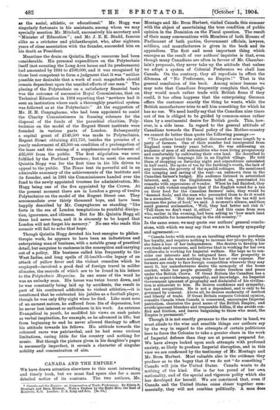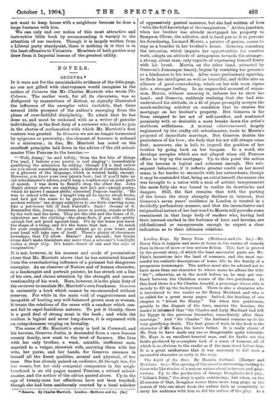WE have drawn attention elsewhere to this most interesting and
timely book, but we must find space also for a more detailed notice of its contents. The two authors, Mr.
• Canada and the Empire an Erami nation of Trade Preferences. By Edwin S. Montagu and Broil Herbert. With a Preface by the Right Hon. the Earl of Rosebery, Le. London ; P. S. King and Sou. [3a. 6d.]
Montagu and Mr. Bron Herbert, visited Canada this summer with the object of ascertaining the true condition of public opinion in the Dominion on the Fiscal question. The result of their many conversations with Members of both Houses of Parliament of both parties, Government officials, lawyers, soldiers, and manufacturers is given in the book and its appendices. The first and most important thing which emerges as the result of our authors' inquiries is that, even though many Canadians are often in favour of Mr. Chamber- lain's proposals, they never take up the attitude that unless we adopt a system of Colonial Preference we shall lose Canada. On the contrary, they all repudiate in effect the dilemma of "No Preference, no Empire !" That is the general conclusion of the book. Among minor lessons we may note that Canadians frequently complain that, though they would much rather trade with British firms if they could, it too often happens that the enterprising German offers the customer exactly the thing he wants, while the British manufacturer tries to sell him something for which he has no use. We need hardly say that the Canadian nine times out of ten is obliged to be guided by common-sense rather than by a sentimental desire for British goods. This, how- ever, is a side issue. In regard to the general attitude of Canadians towards the Fiscal policy of the Mother-country we cannot do better than quote the following passage :—
" The authors heard the subject discussed at some length by a party of farmers. One of their number had immigrated from England some twenty years before. He was addressing an audience of men of all nationalities who were living prosperously and comfortably by cultivating their own land. He described to them in graphic language life in an English village. He told them of shopping on Saturday night and expenditure calculated in half cents. He spoke of tea by the farthing's worth, the lack of any luxuries, the poverty of the squalid cottages. He mentioned the scraping and saving of the rent—an unknown item in the Canadian farmer's budget. His audience listened in astonished interest, and, as the Englishman talked on, punctuated his remarks with expressions of wonder. When he had finished, they stated with violent emphasis that if the English voted for a tax on their food for the Canadian farmers' sake, they would be 'damned fools,' and the man who persuaded them to do it would be a scoundrel. But they are being told that the tax will not increase the price of food,' we said. A moment's silence, and then amid general acclamation, 'Well, they had better not risk it.' Tell them we don't want it, either.' And this came from men who, earlier in the evening, had been asking us how much land. was available for homesteading in the old country.' " In the same sense, we may quote our authors' general conclu- sions, with which we may say that we are in hearty sympathy
and agreement :—
" Canada looks with scorn on an insulting attempt to purchase her loyalty, and requires nothing to increase her prosperity, while she fears a loss of her independence. She desires to develop her own trade and resources, and believes that in working for her own welfare she is working for Imperial welfare. She begs us to con- sider our interests and to safeguard hers. Her prosperity is assured, and she wants nothing done for her at our expense. Her farmers are ready to face foreign competition wherever they may meet it, her manufacturers desire the monopoly of the home market, while her people generally desire freedom and peace under the British Crown. Of Great Britain the Canadian has a right to expect tolerance, sympathy, and knowledge. An Imperial Government ignorant of geography and disdainful of his civilisa- tion is abhorrent to him. He desires confidence and sympathy, tact and recognition. He is not a dependent, and is only to be governed by consent. Above all, he desires modernity of method and liberty of trade. If Great Britain respects Colonial opinion, consults Canada when Canada is concerned, encourages Imperial patriotism, cherishes the good name of the British Empire, and avoids ignorant blunders and irreparable follies, if she avoids con- flict and friction, and leaves bargaining to those who must, the Empire is permanent."
Though it is not exactly germane to the matter in hand, we
must allude to the wise and sensible things our authors say by the way in regard to the attempts of certain politicians here to force the Colonies to take a greater share in the work of Imperial defence than they are at present prepared for.
We have always looked upon such attempts with profound anxiety, as likely to produce Imperial disruption, and in this view we are confirmed by the testimony of Mr. Montagu and Mr. Bron. Herbert. Most valuable also is the evidence they produce as to the bogey that if we do not "do something" Canada will join the United States. Canada wants to do nothing of the kind. She is far too proud of her own nationality, and of the special and vigorous polity which she has developed for herself. We are convinced that, even if Canada and the United States come closer together com- mercially, they will not combine politically. A man does not want to keep house with a neighbour because he does a large business with him.
We can only end our notice of this most attractive and instructive little book by recommending it warmly to the attention of our readers. Though it is largely written from a Liberal party standpoint, there is nothing in it that is in the least offensive to Unionists. Members of both parties may draw from it Imperial lessons of the greatest utility.























































 Previous page
Previous page